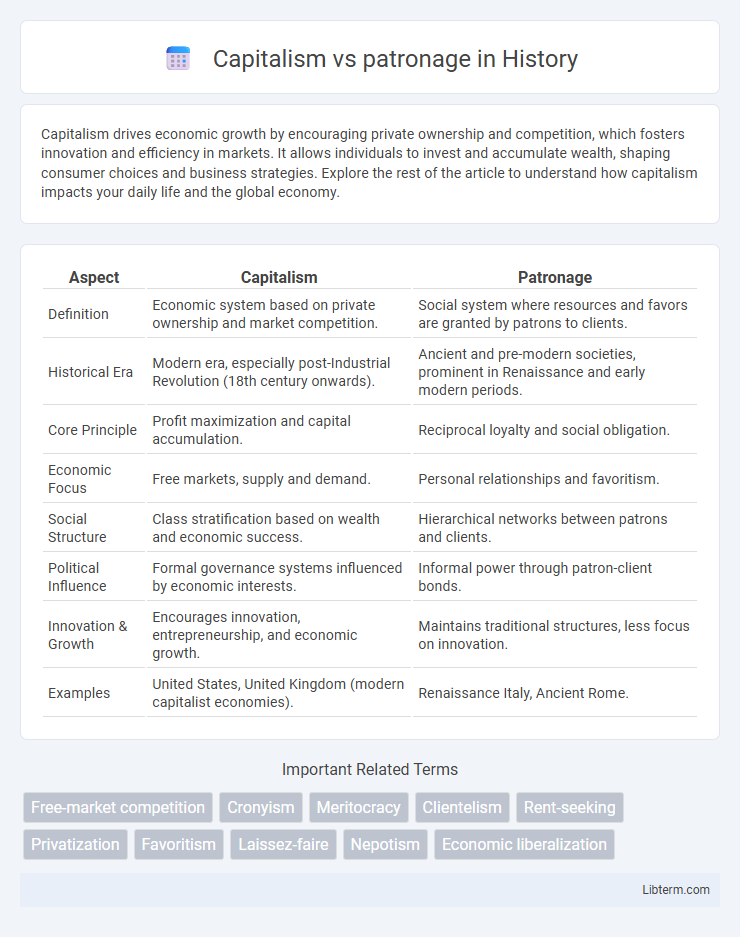Capitalism drives economic growth by encouraging private ownership and competition, which fosters innovation and efficiency in markets. It allows individuals to invest and accumulate wealth, shaping consumer choices and business strategies. Explore the rest of the article to understand how capitalism impacts your daily life and the global economy.
Table of Comparison
| Aspect | Capitalism | Patronage |
|---|---|---|
| Definition | Economic system based on private ownership and market competition. | Social system where resources and favors are granted by patrons to clients. |
| Historical Era | Modern era, especially post-Industrial Revolution (18th century onwards). | Ancient and pre-modern societies, prominent in Renaissance and early modern periods. |
| Core Principle | Profit maximization and capital accumulation. | Reciprocal loyalty and social obligation. |
| Economic Focus | Free markets, supply and demand. | Personal relationships and favoritism. |
| Social Structure | Class stratification based on wealth and economic success. | Hierarchical networks between patrons and clients. |
| Political Influence | Formal governance systems influenced by economic interests. | Informal power through patron-client bonds. |
| Innovation & Growth | Encourages innovation, entrepreneurship, and economic growth. | Maintains traditional structures, less focus on innovation. |
| Examples | United States, United Kingdom (modern capitalist economies). | Renaissance Italy, Ancient Rome. |
Introduction to Capitalism and Patronage
Capitalism is an economic system characterized by private ownership of the means of production, market-driven resource allocation, and profit maximization, fostering competition and innovation. Patronage involves a system where goods, services, or opportunities are exchanged based on personal relationships and loyalty, often substituting meritocratic processes. The contrast between capitalism and patronage lies in institutional frameworks: capitalism promotes open markets and private enterprise, whereas patronage relies on networks of influence and favoritism.
Historical Origins of Capitalism
The historical origins of capitalism trace back to the late Middle Ages and the Renaissance, where the decline of feudalism and the rise of mercantile trade fostered market-based economies. Capitalism emerged from the accumulation of capital, investment in enterprises, and the formation of financial institutions, contrasting sharply with patronage systems that relied on hierarchical relationships and tribute exchanges. Key developments such as the expansion of colonialism, the growth of banking, and the establishment of property rights reinforced capitalist structures distinct from traditional patron-client frameworks.
The Evolution of Patronage Systems
The evolution of patronage systems transformed from localized, personalized exchanges of goods and favors into complex, institutionalized networks embedded within political and economic structures. This transformation contrasts with capitalism's emphasis on market-driven competition, private property, and profit maximization, where relationships are mediated by contracts rather than personal loyalty. Over time, patronage adapted to incorporate bureaucratic processes, yet persistent informal networks often challenge the transparency and efficiency central to capitalist economies.
Core Principles of Capitalism
Capitalism is founded on core principles such as private property rights, free markets, and competition, which drive innovation and economic efficiency. It emphasizes voluntary exchange, profit motive, and minimal government intervention to allocate resources effectively. Unlike patronage systems relying on personal favoritism and political loyalty, capitalism promotes meritocracy and decentralized decision-making.
Key Features of Patronage Networks
Patronage networks are characterized by personal relationships where resources and opportunities are exchanged based on loyalty and mutual obligations rather than market competition. These networks rely heavily on social hierarchies and reciprocal favors, often leading to concentrated power within elite groups who control access to economic and political benefits. Unlike capitalism's emphasis on free markets and impersonal transactions, patronage systems prioritize connections and influence to secure economic advantage.
Economic Impacts: Capitalism vs Patronage
Capitalism drives economic growth through market competition, innovation, and efficient resource allocation, leading to increased productivity and wealth generation. Patronage systems often result in inefficiencies, misallocation of resources, and corruption, hindering sustainable economic development. The contrast between capitalism's emphasis on merit-based competition and patronage's focus on loyalty and favoritism significantly shapes national economic outcomes and institutional quality.
Political Influence and Power Dynamics
Capitalism shapes political influence through market-driven power where wealth enables direct access to policymakers, fostering lobbying and campaign financing that prioritize corporate interests. Patronage systems rely on reciprocal exchanges of favors and loyalty, embedding political power in networks of personal dependence and control over appointments or resources. Power dynamics under capitalism emphasize economic capital as a tool for policy control, whereas patronage reflects a more hierarchical and personalized distribution of political authority.
Social Mobility and Class Structure
Capitalism promotes social mobility through market competition and merit-based opportunities, enabling individuals to improve their economic status irrespective of birth. In contrast, patronage systems reinforce rigid class structures by distributing resources and favors based on personal relationships and loyalty, limiting upward mobility. The capitalist framework often leads to a fluid class hierarchy, whereas patronage perpetuates entrenched elites and social stratification.
Corruption, Meritocracy, and Accountability
Capitalism promotes meritocracy by rewarding innovation and efficiency, yet it is vulnerable to corruption when wealth concentration enables undue influence over political and economic systems. Patronage systems undermine accountability by prioritizing personal loyalty and favoritism over competence and transparent governance, often resulting in inefficiency and corruption. Comparing the two, capitalism encourages competitive merit-based advancement, while patronage perpetuates nepotism and limits mechanisms for holding leaders accountable.
Modern Case Studies: Capitalism Versus Patronage
Modern case studies highlight how capitalism fosters competition, innovation, and market efficiency, contrasting sharply with patronage systems that thrive on personal relationships and favoritism. In countries like Singapore, merit-based capitalism drives economic growth and global competitiveness, while patronage continues to dominate politics in nations such as Nigeria, undermining institutional development and economic progress. These examples underscore capitalism's ability to promote transparency and scalability compared to the localized, opaque nature of patronage networks.
Capitalism Infographic

 libterm.com
libterm.com